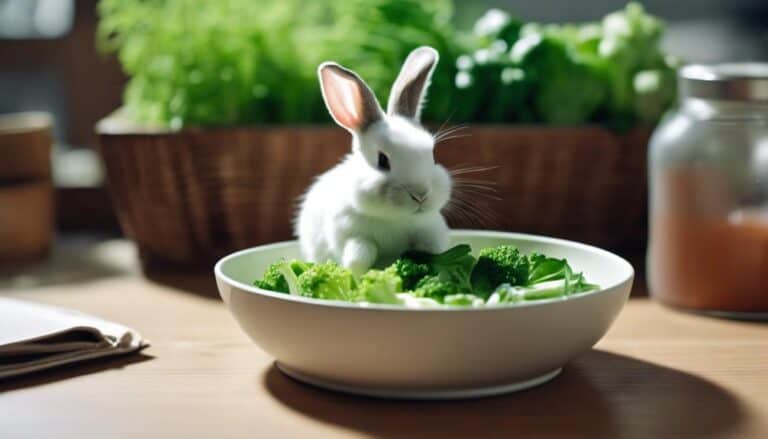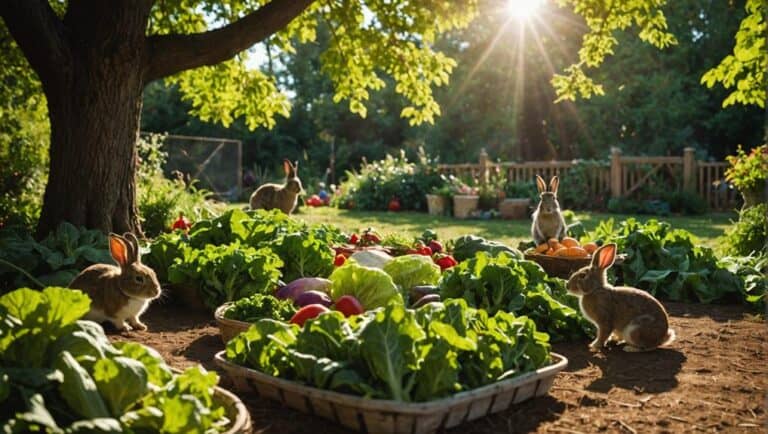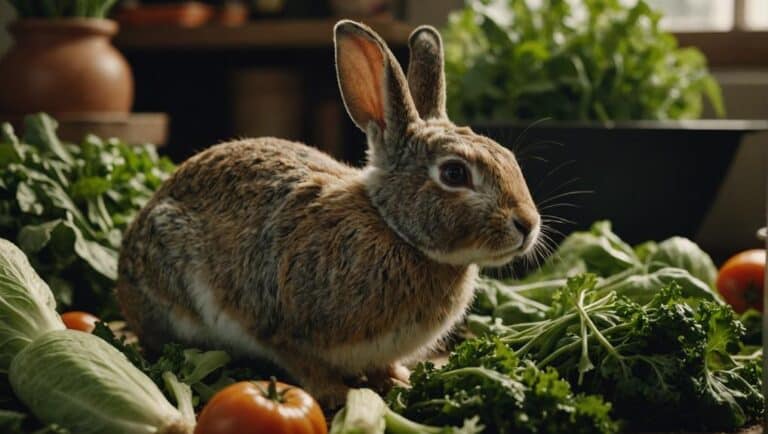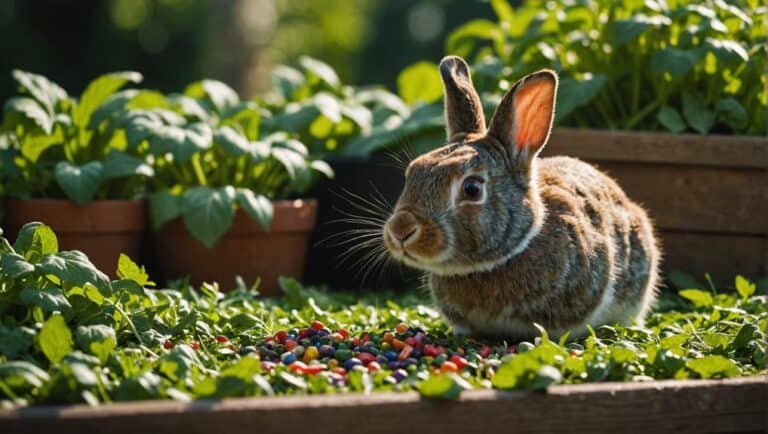If you're concerned about the complexities of balancing hay for your bunny's diet, fear not. Understanding the nutritional needs of your fluffy friend is key to their overall well-being.
By carefully selecting and proportioning the right types of hay, you can provide them with a diet that supports their health and vitality.
But what about the finer details that could make a significant difference in your bunny's diet? There's more to discover about how to make sure your bunny gets the best nutrition possible through their hay intake.
Contents
- 1 Key Takeaways
- 2 Importance of Hay in Bunny Diet
- 3 Types of Hay Suitable for Bunnies
- 4 Balancing Alfalfa and Timothy Hay
- 5 Hay as a Source of Fiber
- 6 Hay Feeding Frequency for Bunnies
- 7 Ensuring Hay Quality for Bunnies
- 8 Frequently Asked Questions
- 9 Are There Other Essential Nutritional Needs for Bunnies Aside from Hay?
- 10 Conclusion
Key Takeaways
- Balance alfalfa and timothy hay for optimal nutrition in rabbits.
- Transition young rabbits to timothy hay at 7 months for health.
- Choose high-quality timothy hay to maintain weight and digestion.
- Consult a vet to ensure hay balance for bunnies' well-being.
Importance of Hay in Bunny Diet
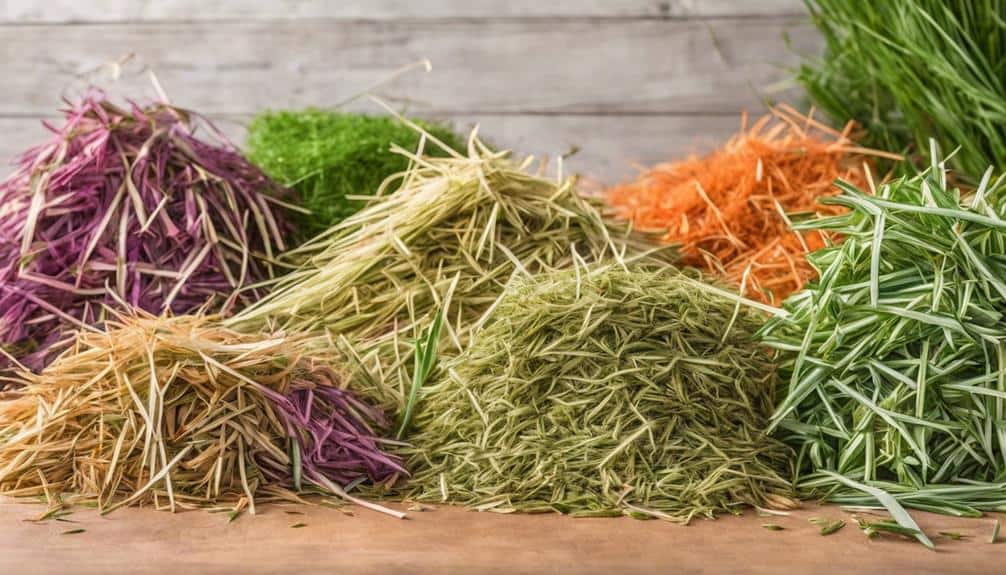
Hay plays an important role in a bunny's diet, serving as a primary source of essential fiber important for maintaining digestive health and overall well-being. For rabbits, hay isn't just a source of nutrition but a vital component that aids in wearing down their continuously growing teeth. The act of chewing hay grinds the teeth, preventing dental issues that could arise if the teeth were allowed to overgrow.
Additionally, the high fiber content in hay is vital for preventing obesity in rabbits by promoting healthy digestion. This fiber helps keep the gastrointestinal tract moving efficiently, reducing the chances of blockages or other digestive problems. By offering unlimited access to fresh, clean hay, you're ensuring that your bunny receives vital nutrition, mimicking their natural foraging behavior and keeping them mentally stimulated and physically active.
Types of Hay Suitable for Bunnies
When considering the dietary needs of bunnies, various types of hay offer distinct nutritional benefits suited to their digestive and dental health requirements.
- Timothy Hay: Known for its high fiber content, Timothy hay is the primary choice for adult rabbits as it promotes dental wear and supports digestive health.
- Orchard Grass Hay: Offering a softer and sweeter alternative to Timothy hay, Orchard grass hay can be more appealing to some rabbits, encouraging increased hay consumption.
- Oat Hay: With a crunchy texture and immature seed heads providing added nutrition, Oat hay offers a delightful taste experience for rabbits while still meeting their dietary needs.
- Organic Meadow Hay: USDA-certified organic, Organic meadow hay is akin to Timothy hay and is an excellent sustainable option for rabbits seeking an environmentally conscious choice.
These hay varieties, along with specialty hay blends like Western Timothy & Orchard Blend, cater to different preferences and nutritional requirements, ensuring that your bunnies receive a well-rounded diet that supports their dental and digestive health.
Balancing Alfalfa and Timothy Hay
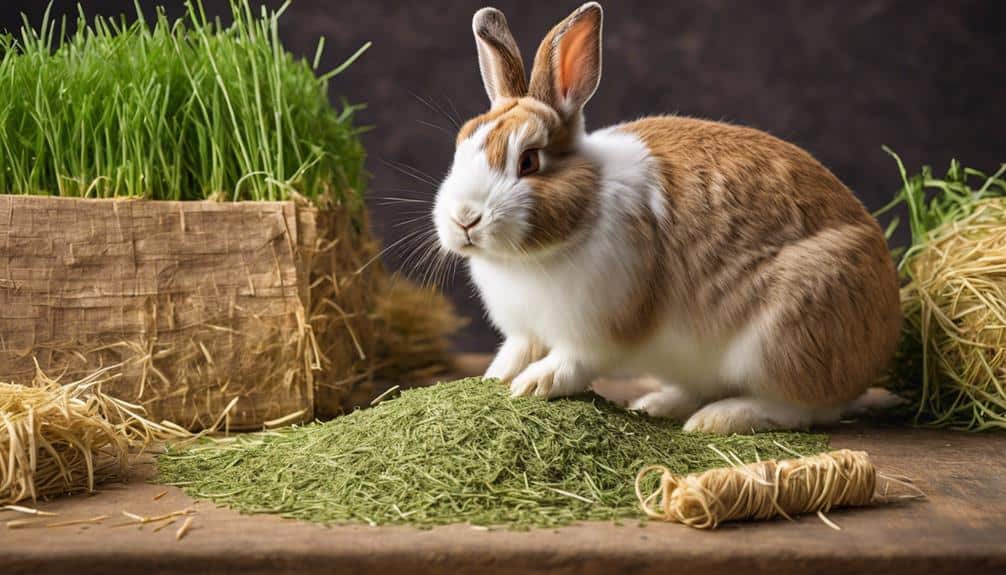
When considering the balance between alfalfa and timothy hay for your rabbits, it's important to understand the specific benefits of each type.
While alfalfa hay is rich in protein and calcium, ideal for young rabbits, timothy hay is recommended for adults due to its balanced nutrition.
To guarantee good health and prevent issues like obesity and bladder stones, carefully shifting your rabbits from alfalfa to timothy hay as they mature is essential.
Alfalfa Benefits for Bunnies
High in essential nutrients such as protein, calcium, and fiber, alfalfa hay provides crucial benefits for the growth and development of young rabbits. When considering the diet of your rabbit, it's important to understand the specific advantages that alfalfa hay offers:
- Supports Healthy Bone Development: The calcium content in alfalfa hay aids in maintaining strong bones in young rabbits.
- Essential for Teeth Maintenance: Rabbits need adequate calcium for proper teeth health, and alfalfa hay can contribute to meeting this requirement.
- Limited for Adult Rabbits: Due to the risk of obesity and urinary issues from excess calcium, adult rabbits should consume alfalfa hay in moderation.
- Balance with Grass Hay: Balancing alfalfa hay with grass hay like timothy hay ensures adult rabbits receive a well-rounded diet.
Timothy Hay Importance
After understanding the benefits of alfalfa hay for young rabbits, the focus shifts to the importance of incorporating timothy hay into the diet of adult rabbits for ultimate health and well-being.
Timothy hay is vital for adult rabbits as it should make up 80-90% of their diet, aiding in maintaining a healthy weight, promoting dental health, and supporting proper digestion due to its high fiber content.
Shifting adult rabbits from alfalfa to timothy hay around 7 months of age helps prevent issues like obesity and excessive calcium intake.
With a balanced nutritional profile including low protein, low calcium, and low moisture levels, timothy hay supports adult rabbits' natural foraging behavior and overall well-being, making it essential for their diet.
Hay Balancing Tips
To guarantee ideal nutrition for your rabbits, carefully balancing the intake of alfalfa and timothy hay is essential for their overall health and well-being. When providing hay for your small grass-eating companion, consider the following tips:
- Selecting the Best Hay: Choose high-quality timothy hay as the primary feed for adult rabbits to maintain a healthy diet.
- Balancing Protein and Calcium: Limit alfalfa hay intake for adult rabbits due to its high calcium content, which is best suited for young rabbits needing extra nutrition.
- Changing at the Right Time: Change young rabbits from alfalfa to timothy hay around 7 months of age to prevent health issues associated with excess calcium intake.
- Consulting a Professional: Consult a veterinarian to determine the appropriate balance of alfalfa and timothy hay for your rabbit's specific needs.
Hay as a Source of Fiber
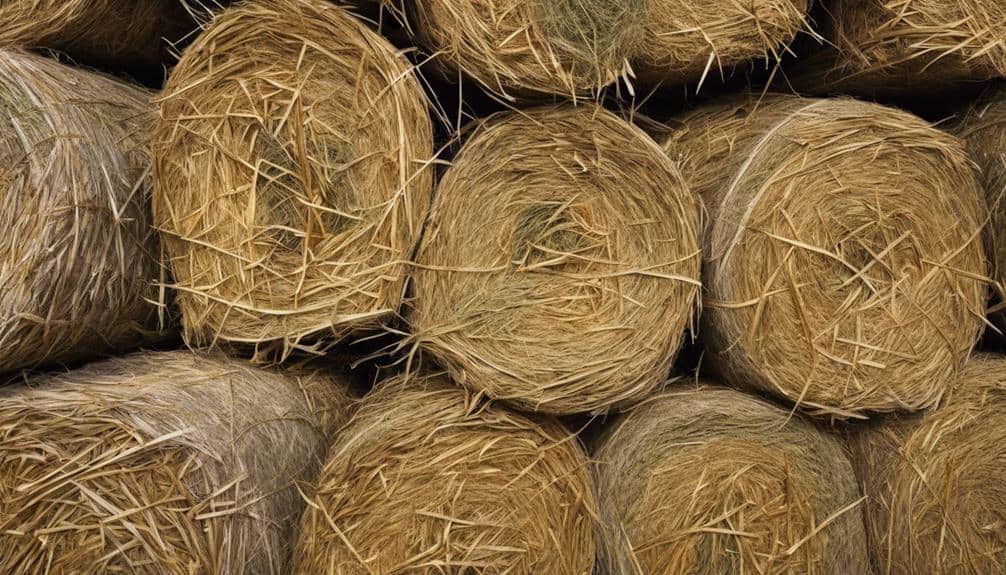
Hay plays a crucial role in providing the necessary fiber for your rabbits, contributing to their digestive health and overall well-being. Different types of hay, such as Timothy hay, offer varying levels of fiber content, each beneficial in its unique way.
Understanding the importance of fiber in hay will help you make informed decisions when selecting the best hay for your bunny's diet.
Importance of Fiber
Fiber, an essential component for ensuring prime digestive function in rabbits, is mainly sourced from hay in their diet. Here are four key reasons why fiber from hay is important for your bunny's well-being:
- Digestive Health: Fiber aids in maintaining gut motility, preventing gastrointestinal issues.
- Dental Health: High-fiber diets from hay help wear down continuously growing teeth, preventing dental problems.
- Cecal Function: The fiber content in hay supports healthy cecal function, important for food fermentation.
- Obesity Prevention: Adequate fiber intake promotes satiety and proper digestion, helping prevent obesity in rabbits.
Ensuring your rabbit has sufficient fiber from hay is essential for their overall health and vitality.
Types of Hay
The variety of hay options available for rabbits not only provides essential fiber for their diet but also caters to different preferences and nutritional needs. Rabbits eat Timothy hay as a common choice, aiding in digestive health.
Orchard Grass hay offers a softer, sweeter alternative appealing to some rabbits. Oat hay, with its crunchy texture and immature seed heads, provides a satisfying eating experience rich in nutrition.
Organic Meadow hay, a USDA-certified organic option similar to Timothy hay, suits rabbits seeking sustainable choices. Specialty hay blends such as Western Timothy & Orchard Blend offer variety and nutrition, catering to diverse tastes and needs.
Understanding these types of hay allows you to select the most suitable option to meet your rabbit's dietary requirements effectively.
Hay Feeding Frequency for Bunnies
When considering the feeding frequency of hay for bunnies, it's essential to understand the specific dietary requirements based on the age and health status of the rabbits. Here are some key points to keep in mind when determining how often to feed hay to your bunnies:
- Age Matters: Young rabbits under 7 months old can benefit from daily consumption of alfalfa hay to support their growth and provide additional nutrients.
- Adult Diet: Adult rabbits should primarily eat grass hay like timothy hay daily to aid in proper digestion and overall health.
- Treat Option: Alfalfa hay can be given as a treat or supplemental feed a few times a week for adult rabbits, ensuring they receive essential nutrients without overdoing it.
- Consult a Professional: Overfeeding adult rabbits with alfalfa hay can lead to health issues such as bladder stones due to excess calcium. It's advisable to consult a veterinarian to determine the appropriate feeding frequency and amount of alfalfa hay for your rabbits.
Ensuring Hay Quality for Bunnies
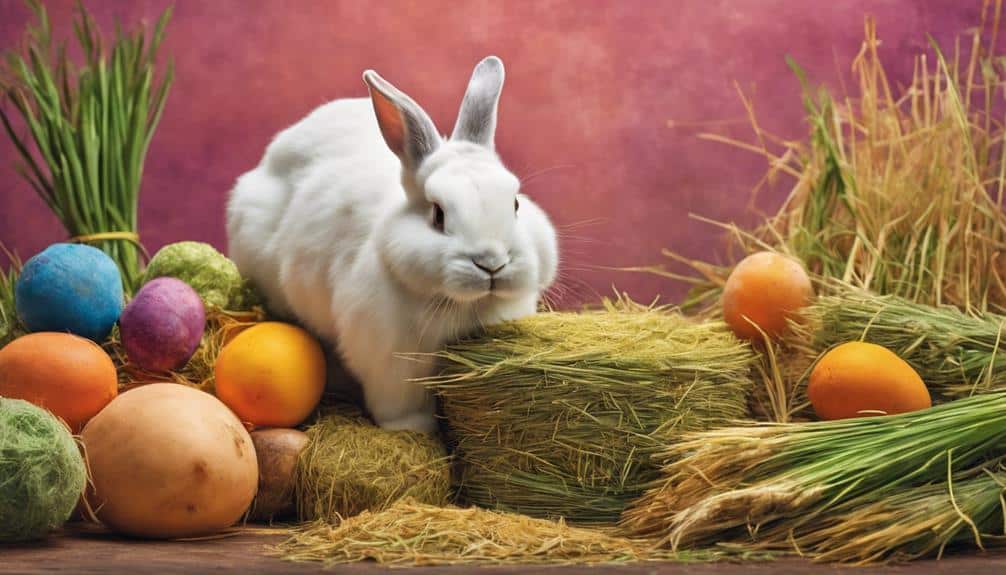
To guarantee excellent health and nutrition for your bunnies, choose fresh hay with a vibrant green color and a pleasant aroma indicative of high nutrient content. Moldy hay can disrupt bunnies' digestive systems, so it's important to store hay properly in dry, rodent-free containers.
Proper hay storage in aluminum trash cans with lids or closed sheds prevents moisture and pest contamination that can harm bunnies. Opt for cost-effective options like 50lb bales of hay over smaller bags to make sure a consistent and economical hay supply for your bunnies.
Avoid hay with molasses or additives, as they can upset bunnies' digestive systems and compromise their health. By adhering to these guidelines, you can maintain the quality and freshness of the hay you provide to your bunnies, ensuring they receive the necessary nutrients for the best health and well-being.
Frequently Asked Questions
What Is the Most Nutritious Hay for Rabbits?
Timothy hay benefits adult rabbits with high fiber, low protein, and calcium. Alfalfa hay suits young rabbits due to higher calcium and protein. Orchard grass provides a softer alternative, while oat hay offers crunch and nutrition. Meadow hay is sustainable.
What Is a Balanced Diet for Rabbits?
To maintain a balanced diet for your rabbits, make sure the majority of their intake consists of hay. This promotes digestive health and overall well-being. Supplement with fresh veggies and a small amount of pellets for best nutrition.
What Percentage of a Rabbit's Diet Should Be Hay?
Hay should make up 80-90% of your rabbit's diet. Grass hay like timothy hay is ideal for adults. Monitor and adjust the amount based on size. Always provide a fresh supply of hay for dental health and proper digestion.
What Do Rabbits Do to Maximise the Nutrients Obtained by Their Food?
To maximize nutrients obtained from their food, rabbits practice coprophagy. By consuming their soft fecal pellets rich in vitamins, minerals, and proteins through caecotrophy, they enhance nutrient absorption, aiding in digestive health and overall well-being.
Are There Other Essential Nutritional Needs for Bunnies Aside from Hay?
Yes, there are other essential nutritional needs for bunny health and hay, such as fresh vegetables, fruits, and a small amount of pellets. These foods provide important vitamins and minerals that are necessary for a well-rounded diet. However, hay should always remain the primary source of nutrition for bunnies.
Conclusion
In summary, balancing hay intake is vital for top-notch nutrition in bunnies. By incorporating both alfalfa and timothy hay into their diet, you can provide essential nutrients for growth and maintenance.
Remember to take into account the age and specific needs of your rabbit when choosing hay types. Ensuring high-quality hay and maintaining a consistent feeding schedule will promote overall health and well-being in your furry friend.
Choose wisely, and your bunny will thrive.



